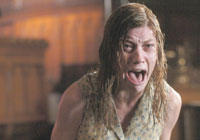Slowing Down
Parents are the number one influence on their children. Your kids look to you for lessons in life that have to do with business, relationships, commitments, convictions, and spirituality. I know that is scarey, but it is true.
One way you can slow down, improve relationships with your kids, and help them grow spiritually while you grow spiritually is by being obedient to one of the commandments, "Keep the Sabbath Holy." Develop a day of rest, the best possible, and make it a day to focus on God and family.
Here are some excerpts from an article in ChristianParentingToday.Com. The article is entititled: "Keepin' It Holy". Click on the title and read the entire article.
Like most of parenting, Sabbath-keeping is a matter of modeling right behavior for our kids. Parents who discipline themselves to slow down, rest, and go to church one day a week will help their kids most of all. Keeping Sabbath with your family is not forcing an arbitrary "should" or "must" on your kids; it's helping them meet a deep human need.
In our frantic, frenetic society, where first-graders are in football leagues and children carry PDAs and Day-Timers to keep up with elementary- school extracurriculars, we need to "remember the Sabbath day by keeping it holy" (Exodus 20:8) more than ever. But do we? Most of us recognize those words from the Ten Commandments, but we don't know how, or even if, they apply to us today.
"Our culture sends us the opposite message—if you're not frantically on top of everything, belonging to every imaginable club, and working all the time, you will be unhappy and unsuccessful," says Yust. There is real power, she adds, in taking a rest. Sabbath helps us learn that God is in charge, and Sabbath observance teaches us that taking a break is good. It's one way to say to your kids, "You will get into college even if you don't have that eighth extracurricular activity on your application."
Instead of making Sundays primarily a time when one can't work (or, as was the rule in my grandmother's house, can't go to the movies), make Sunday afternoon a family time for all those restful, enriching activities you never have time for during the week. In an age when many families don't eat breakfast or dinner together, make Sunday a time of a regular family meal, even if it's just a simple post-church BLT. At my church, several families and friends gather together for regular Saturday night meals: special, leisurely dinners that usher in the Sabbath.
But the Sabbath isn't only about family time. There should also be elements of Sabbath observance that draw the family's attention to God—attending church together, of course, is a good starting point.
Sabbath, after all, is very counter-cultural. It's a godly way of challenging many false assumptions that govern our broader culture. As Dorothy Bass says, "Sabbath-keeping forms habits of cultural resistance around pressure-points that are at the heart of our culture's distress: consumerism, time-famine, family fragmentation." For Bass, "decommericalizing the Sabbath is a key thing. I realized I needed to stop shopping on the Sabbath because shopping was one place where my own sin and the culture's need intersected. I was finding myself sitting in church thinking about getting a new piece of furniture rather than being properly attentive to God!"
though it can be tempting to use soccer as an excuse for avoiding the discipline of Sabbath. One solution, of course, is to declare Saturday your family Sabbath—beginning Saturday morning and concluding with church Sunday morning, well before the soccer game.
It's also important not to be legalistic. Maybe your family heads to the soccer field after a Sabbath lunch together. Playing sports—and watching kids play—can be relaxing and joyful, after all.
Parents can help their children seek employment at businesses that will honor the family's Sabbath practices.










